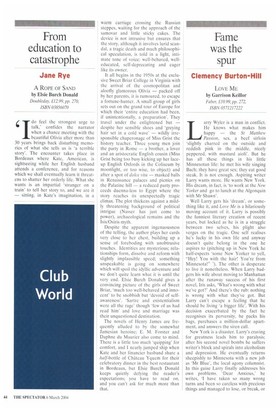From education to catastrophe
Jane Rye
A ROPE OF SAND by Elsie Burch Donald Doubleday', £12.99, pp. 270, ISBN 03856070 C I do ,feel the strongest urge to talk,' confides the narrator
when a chance meeting with the beautiful Olivia after more than 30 years brings back disturbing memories of what she tells us is 'a terrible story'. The encounter takes place in Bordeaux where Kate, American, is sightseeing while her English husband attends a conference, and for reasons which we shall eventually learn it threatens to shatter her orderly life. What she wants is an impartial 'stranger on a train' to tell her story to, and we are it sitting. in Kate's imagination, in a warm carriage crossing the Russian steppes, waiting for the approach of the samovar and little sticky cakes. The device is not intrusive but ensures that the story, although it involves lurid scandal, a tragic death and much philosophical speculation, is told in a light, intimate tone of voice: well-behaved, welleducated, self-deprecating and eager like its owner.
It all begins in the 1950s at the exclusive Sweet Briar College in Virginia with the arrival of the cosmopolitan and aloofly glamorous Olivia — packed off by her parents, it is rumoured, to escape a fortune-hunter. A small group of girls sets out on the grand tour of Europe for which their 'entire education had been, if unintentionally, a preparation'. They travel under the enlightened but — despite her sensible shoes and 'greying hair set in a cold wave' — wildly irresponsible chaperonage of Miss Grist the history teacher. Three young men join the party in Rome — a brother, a lover and an aristocratic English cousin (Miss Grist being too busy kicking up her laceup English Oxfords in the Coliseum by moonlight, or too wise, to object) and after a spot of dolce vita — masked balls in Renaissance palaces and picnics on the Palatine hill — a reduced party proceeds duenna-less to Egypt where the story reaches its unexpectedly tragic climax. The plot thickens against a mildly threatening background of political intrigue (Nasser has just come to power), archaeological remains and the Isis/Osiris myth.
Despite the apparent ingenuousness of the telling, the author plays her cards very close to her chest, building up a sense of foreboding with unobtrusive touches. Identities are mysterious; relationships form, dissolve and reform with slightly implausible speed; something unspeakable is going on somewhere which will spoil the idyllic adventure and we don't quite learn what it is until the very end. Elsie Burch Donald gives a convincing picture of the girls of Sweet Briar, 'much too well-behaved and innocent' to be snobbish but 'devoid of selfawareness'. 'Sartre and existentialism were all the rage' though 'few of us had read him' and love and marriage was their unquestioned destination.
The novels of Henry James are frequently alluded to by the somewhat Jamesian heroine; E. M. Forster and Daphne du Maurier also come to mind. There is a little too much 'quipping' for comfort, and I nearly jumped ship when Kate and her financier husband share a half-bottle of Château Yquem for their celebratory dinner in the best restaurant in Bordeaux, but Elsie Burch Donald keeps quietly defying the reader's expectations; you have to read on, and you can't ask for much more than that.


















































































 Previous page
Previous page